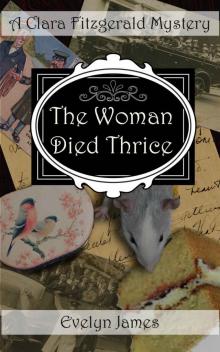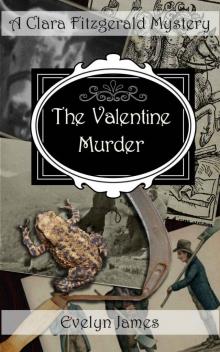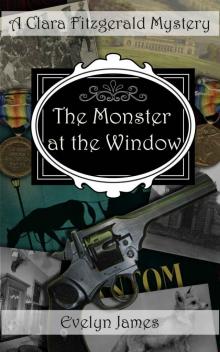- Home
- Evelyn James
Grave Suspicions of Murder Page 2
Grave Suspicions of Murder Read online
Page 2
Mr Erikson and Mr Graves had a nice suite of offices in one of the older properties in town. It boasted their names above the door and in the front window was a discreet advertisement for their various services. Mr Graves was noted as a specialist in wills and the various legal matters that could result from a sudden death. Annie paused to wonder who would be dealing with the tricky matter of Mr Graves' unexpected exit from this life? Would it be Mr Erikson? Or would he be considered a little biased in the matter?
Oh dear, Annie mused to herself, I am beginning to sound like Clara already!
Annie opened the door of the solicitor's building and found herself in a neatly appointed reception area. A well-dressed middle-aged woman sat behind a high wooden desk and peered at Annie through half-moon glasses.
“Good morning,” the woman said briskly.
“Good morning,” Annie tried her best to still her grumbling nerves and pretend she had Clara's confidence. “I have an appointment to see Mr Erikson.”
The receptionist glanced down at a book before her.
“Miss Fitzgerald?”
“I am her representative, Miss Green. She called ahead to inform you of the change.”
The receptionist ran a finger along the entry in her book.
“Ah, yes. I shall see you up,” the receptionist stood and escorted Annie through a doorway and up a set of stairs. They found themselves on the first floor, heading towards a door marked 'Mr Erikson'. The walls were lined with oil paintings of historic battles, which Annie assumed were meant to be metaphorical for the legal battles the solicitors dealt with every day. Though she rather found them unsettling.
At Mr Erikson’s door the receptionist asked her to wait, then tapped lightly on the wood. A voice summoned her to enter and she disappeared for a moment to announce Annie's arrival. When she reappeared she informed Annie she could enter, before returning to her desk downstairs.
Annie found Mr Erikson sitting at his desk. He was a stern looking man with sharp features and a very beaky nose. He seemed to hunch in his suit like an old scarecrow in a field and his appearance did not make Annie feel precisely welcome.
“Miss Green?” he asked.
“Yes,” Annie approached the desk, feeling a cold sweat coming over her. “Clara, I mean, Miss Fitzgerald, 'phoned concerning the change of plans.”
“She did, do please take a seat. I was sorry to hear of Miss Fitzgerald's accident. How is she doing?”
“More annoyed about being unable to leave the house than anything else,” Annie shrugged. “She is rather a rotten patient.”
Mr Erikson laughed at this candid remark and suddenly he did not seem so intimidating. The suit seemed to sit better on his shoulders and his stern look almost vanished. Annie relaxed a little.
“So, you are acting as her agent?” Erikson asked when his amusement subsided.
“Yes, but she said I must assure you that she will be looking at all the evidence I gather personally.”
“Of that I have no doubt, I have heard good things about Miss Fitzgerald's thoroughness and efficiency. It was why I went to her in the first place. Tell me, did you know Mr Graves at all?”
“I did, just a little,” Annie answered. “He went to the same church as my parents, and used to help out at all the fundraisers and fetes.”
“That sounds like my colleague,” Mr Erikson gave a long sigh. “I met Isaac when he was just finishing his legal training. I was a few years older than him and established in my father's firm, but I wanted to branch out. I persuaded Isaac to join me in my business venture. I put in most of the money, but he repaid me well over the years. He spent countless hours in these offices dealing with case after case. I felt almost lazy in comparison. He was dedicated to his work and to his clients. Mr Graves cared, that is why people came to him.”
“But then why would anyone want him dead?” Annie said bluntly before she could stop herself. She could have kicked herself. She had done exactly what Clara had warned her not to do.
“Oh, all solicitors, however diligent and fair, find themselves confronted with the occasional aggrieved client. I dare say Isaac had his fair share, though we rarely exchanged views on our cases, so I cannot say with any degree of certainty what those grievances might have been. Then there was always his family.”
“His family?”
“Yes. Isaac had an elderly mother he cared for, and several sisters, all unmarried. His mother and sisters reside in a rather splendid red brick Victorian manor house, just outside Brighton. Isaac paid all their bills. There was some money left over in investments from his late father, but not enough to keep the widow and the daughters in the style to which they were accustomed. I am aware that Isaac's generosity towards his mother and sisters did not always sit well with his wife, Grace.”
“She did not appreciate all his money going to them?”
“I think it was more a case that she did not like the long hours he worked just so he could provide for both his own, and his mother's, household. I think she felt his family took liberties over his income.”
Annie nodded, an understandable complaint from a wife who must have felt a tad neglected.
“But none of that amounts to a desire to kill poor Mr Graves, surely?”
“I see you are thinking of motive, and I concur that nothing I have stated equates to a good motive for murder. Unless, of course, Isaac had finally had enough of one or other of the parties he was tied to.”
“Hardly his wife.”
“No, but, supposing he told one of his sisters that he was no longer going to pay all their expenses? They might imagine they would be better off with him dead and their share of any inheritance he left, than to be 'cut off'.”
Even Annie could see that statement required a hefty amount of speculation.
“I take it from your look you think I am being irrational. Perhaps I ought to offer some proof for my case, after all, I am a legal man, and I know these matters cannot be dealt with on hearsay alone,” Erikson opened a drawer and produced a sheaf of papers. “I am the executor of Isaac's will. When I was studying its contents shortly after his death I was alarmed by some of the details. In fact, that was the reason I went to Miss Fitzgerald in the first place. What I expected to find in Isaac's will was an even distribution of his assets. Instead, I discovered that one of his sisters was to get the lion share of his estate, while his remaining family, including his wife, were due only token amounts. It struck me as a very odd will for any responsible man like Isaac to make.”
“How do you explain it?”
“I cannot, except that for some reason Isaac felt the need to favour one of his sisters out of all proportion to the rest. Even more curiously, this will was made in the last few months. Shortly after his bout of pneumonia. His prior will I had seen and I knew its contents well enough. It was a very clear distribution of his money evenly between the family. Completely different from the will I found among his important papers.”
“Could the will be fraudulent?”
“That would not be unheard of, but I found it in our private safe. As far as I am aware, I am the only other person to know the combination for the safe. Though, I could be mistaken on that,” Erikson sighed. “So much for motive, now let me explain what first troubled me about Isaac's death. I was the one who found him, you know.”
“Oh dear, I am sorry,” Annie said sympathetically.
“Yes. We always dined together at midday. It was my little insistence; else Isaac would continue to work without eating anything. We always went across the road to the pub and had sandwiches and a pint of beer each. Isaac never kept good track of time, so I would fetch him a few minutes before midday. It was a routine we had lived by for years,” Erikson paused for a moment, as his memories caught up with him. “That dreadful day I walked along the corridor to his office and knocked on the door. No one responded, which was strange because I have an arrangement with our receptionist to book no appointments for Isaac after eleven. We all looked out
for him, you see.
“I knocked again, but still no reply, and I started to feel uneasy. Isaac was forgetful over time, but he never ignored someone at his door. There had only been one other time when he had not responded to my knock, and that was when he had been taken bad with pneumonia in his office. He never should have come into work that day, mind you, but he did. Isaac was dedicated like that. On that occasion, when he had not answered his door, I had mulled over the matter, left it for a while, then returned and tried again. When I still received no response I opened the door and he was slumped at his desk, hardly breathing.
“So, you see, when all this happened in just the same manner a second time, I became extremely worried. I hammered on his door and then opened it. There he was slumped at his desk yet again. I imagined a relapse and ran to Miss Parker downstairs to ask her to call for a doctor. It was only when the doctor arrived that we discovered he was dead.
“The obvious assumption was that he had suffered heart failure from his weakened condition, but something seemed odd to me. For a start, the doctor said he had been dead for at least an hour, or thereabouts, but I could have sworn I heard someone leaving his office just half an hour before I went to knock. I remember thinking that Isaac had been with his ten o'clock client a long time. Of course, I could be wrong about what I heard. But then I noticed the glass on his desk. There was a glass of water, almost empty. Isaac never had a drink on his desk, in case it should spill and ruin the document he was working on. Equally, I had never seen him drink a glass of water. Tea, yes. Beer, yes. But Isaac was not a man who drank water. The glass and pitcher were reserved for the use of clients and, even then, they were not allowed to be placed on his desk.”
Mr Erikson paused and spread his hands out palm up, as if to say 'that is all I can offer you'. Annie felt it was rather loose evidence to start speculating on a murder over.
“What was Mr Graves working on when he died?”
“The only document on his desk was a will for one of our clients. She has just passed and there is some concern among the family that the will is not correct. I assume Isaac was studying the details, trying to discover if their concerns were founded, when he died. The client liked to change her will often, and in situations like that there is always argument over whether the final will is the correct one. I advise clients to store their wills with us, then there can be no argument as we will only keep the last legal version they created. But some clients insist on keeping their wills at home. I do believe Isaac's client had the disagreeable habit of keeping several previous versions of her will, as well. We advise against that, naturally, but you can hardly go into a person's house and check for out-of-date wills, can you?”
Annie felt they were going off topic. Unless Mr Erikson had suspicions about Isaac's final case?
“No, no,” he answered when she posed the question. “I do not suspect anything of the sort. Besides, Isaac was only just starting on the problem. It would have been pointless killing him at that stage, I would imagine.”
“Who was the last person to visit Isaac?” Annie asked, feeling that, despite their lengthy conversation, she had no real concrete proof to bring back to Clara that Mr Graves had been murdered.
“Mrs Hatton. I can give you her address. Unfortunately, I do not know what the meeting was about.”
“A will, perhaps? Mr Graves was a specialist in that area,” Annie suggested.
“Perhaps, but I really could not say.”
By the time Annie left the solicitors’ office and set off for home, she felt she had few insights to offer Clara. Mr Erikson's concerns were based on very little indeed, except for a possible door slamming. She wondered what Clara would suggest? Perhaps digging deeper into the matter? Well, at least her first interview had passed without incident, that made Annie feel better. She stopped at a flower shop to buy a bunch of daffodils, then headed for home.
Chapter Three
Dr Cutt peered over his ancient pair of spectacles. He contended that he only needed them for close work and had not bothered to have his eyes checked in years. As a result he was wearing glasses far too weak to be of any assistance to his vision. He almost had his nose pressed to Clara's foot as he studied her bruises.
“You were very lucky, young lady,” Dr Cutt finally stood up and went to his bag for more bandages. “The damage is relatively minor.”
“So I shall be able to get up and walk about soon?” Clara asked hopefully.
“Oh dear me, no,” Dr Cutt shook his head. “The foot is a delicate instrument. It needs time to heal sufficiently. I suggest at least two months of complete rest. I would not even expect you to attempt to put on a shoe with a foot in that state.”
Clara glowered at her foot moodily.
Tommy rolled himself into the room at that point.
“Clara, how do you tell if bacon is burning? It smells odd… oh, Dr Cutt,” Tommy looked sheepish at the sight of the doctor. “I thought you had finished.”
“No, my boy, bandages to be put on as yet. But I am glad to see you,” Dr Cutt was grinning like a spider who has just caught a fly. “I was growing concerned when you missed our last two appointments.”
“Tommy?” Clara gave him a stern look.
Tommy had the decency to look abashed.
“So much was going on,” Tommy deflected the comment. “I just forgot about the appointments.”
“Ah, good, because I was concerned you had decided against my treatment suggestion,” Dr Cutt smiled, he was in his eighties and a true man of medicine who could not imagine retiring. He was also a very progressive doctor, who had spent a great deal of time studying the causes and symptoms of shell-shock. Dr Cutt was firmly convinced that Tommy's inability to walk was due to a mental trauma, rather than physical damage. Tommy had certainly suffered plenty of both while serving in the trenches, but his problems with his legs still remained a mystery to himself and those around him.
“What treatment had you suggested?” Clara interjected.
It had taken a good deal of persuasion to get Tommy to see Dr Cutt in the first place. She had not known Tommy was skipping appointments with the doctor.
“I was thinking that hypnosis might prove therapeutic. You have heard of that?”
“I recall it was quite popular in the last century for helping hysterics,” Clara said, regretting her words when Tommy glared at her.
“I am not a hysteric!”
“No, of course not,” Dr Cutt smoothed over the error. “Hypnosis has far more wide ranging uses than just treating hysteria. It helps to tap into the unconscious mind, as I said to you before, the problem you have with your legs is due to a mental block, and if we can break it, then you shall walk again.”
Tommy still looked uncomfortable. He was always ill-at-ease when people started talking about the vagaries of the mind, especially his mind. He was not convinced by all this psychology lark and it deeply troubled him that he was somehow stopping his legs from working because of a problem in his head, not in the physical muscles. Tommy was very much a man of his age, and he believed mental illness was something that only occurred to the weak willed. He had no ill-will towards those that suffered from such complaints, but he found it deeply troubling to imagine he was one of them.
“Surely it is worth a try, Tommy,” Clara said very gently. “Imagine if hypnosis helped you to walk again?”
“We have experimented with the use of sedatives,” Dr Cutt added, “with some success, but I need to use more direct methods to reach the unconscious mind. It is perfectly safe, I might add, I have been performing hypnosis for the last forty years.”
Tommy looked unconvinced.
“How does it work?” Clara asked.
“I begin by asking the patient to focus on an object, say my pocket watch, then I gently put them into a state of deep relaxation, as if they were asleep. Only, I can still communicate with them, and ask them to do things. However, they will never do anything out of their nature, or that would harm themsel
ves. After extensive study it has been proven hypnosis cannot make a man walk off a bridge, say, because even in an unconscious state the body is acutely aware of self-preservation. Nor could you ask a man under hypnosis to do anything against his own moral code. I could not make Tommy murder someone, for instance.”
“Then, I see no harm in trying it,” Clara fixed her eyes on her brother. “If it works, then you will walk again, and wouldn't that be utterly wonderful? And if it doesn't, then nothing is lost.”
Tommy knew they were talking sense, but still hesitated. His attention wandered to his legs. Why could he not use them? Why did they not obey his commands? Doctor after doctor had told him that nothing was physically wrong with his legs, yet, no matter how hard he tried, they refused to move.
“Perhaps I could offer a demonstration?” Dr Cutt suggested, “Miss Fitzgerald, might you be willing to try first?”
“I suppose I would,” Clara said. “But I have nothing you can cure by hypnosis, unless you can fix this foot of mine.”
“No, no, it will be a pure demonstration of the process,” Dr Cutt stood before her. “Now, if I might ask you to look at my watch, good. Focus on the watch face. Feel all your body relaxing, your limbs feel light as a feather. You are feeling very tired, going to sleep would be good, yes? Let your eyes shut, good, good. You are very calm. Your body is floating on a cloud of air. Nothing matters, nothing hurts. You are deep, deep asleep.”
Dr Cutt paused and looked at Tommy. Carefully he picked up one of Clara's hands, then let it go so it flopped back down onto the arm of her chair. She appeared completely relaxed and unaware of him.
“Now, Miss Fitzgerald, might I ask you to repeat the entire list of the kings and queens of England from 1066, as you learned in school?”
“Clara could never remember all those,” Tommy interrupted politely, but before he had finished speaking Clara had begun reciting a list of names. As he listened in amazement, she rolled off the complete lineage of the monarchy from William the Conqueror without a single mistake.

 The Woman Died Thrice
The Woman Died Thrice The Poison Pen
The Poison Pen The Fossil Murder
The Fossil Murder The Green Jade Dragon
The Green Jade Dragon Murder on the Mary Jane
Murder on the Mary Jane Murder and Mascara
Murder and Mascara Mr Lynch's Prophecy
Mr Lynch's Prophecy The Traitor's Bones
The Traitor's Bones The Valentine Murder
The Valentine Murder Death at the Pantomime
Death at the Pantomime The Cowboy's Crime
The Cowboy's Crime The Trouble With Tortoises
The Trouble With Tortoises The Monster at the Window
The Monster at the Window